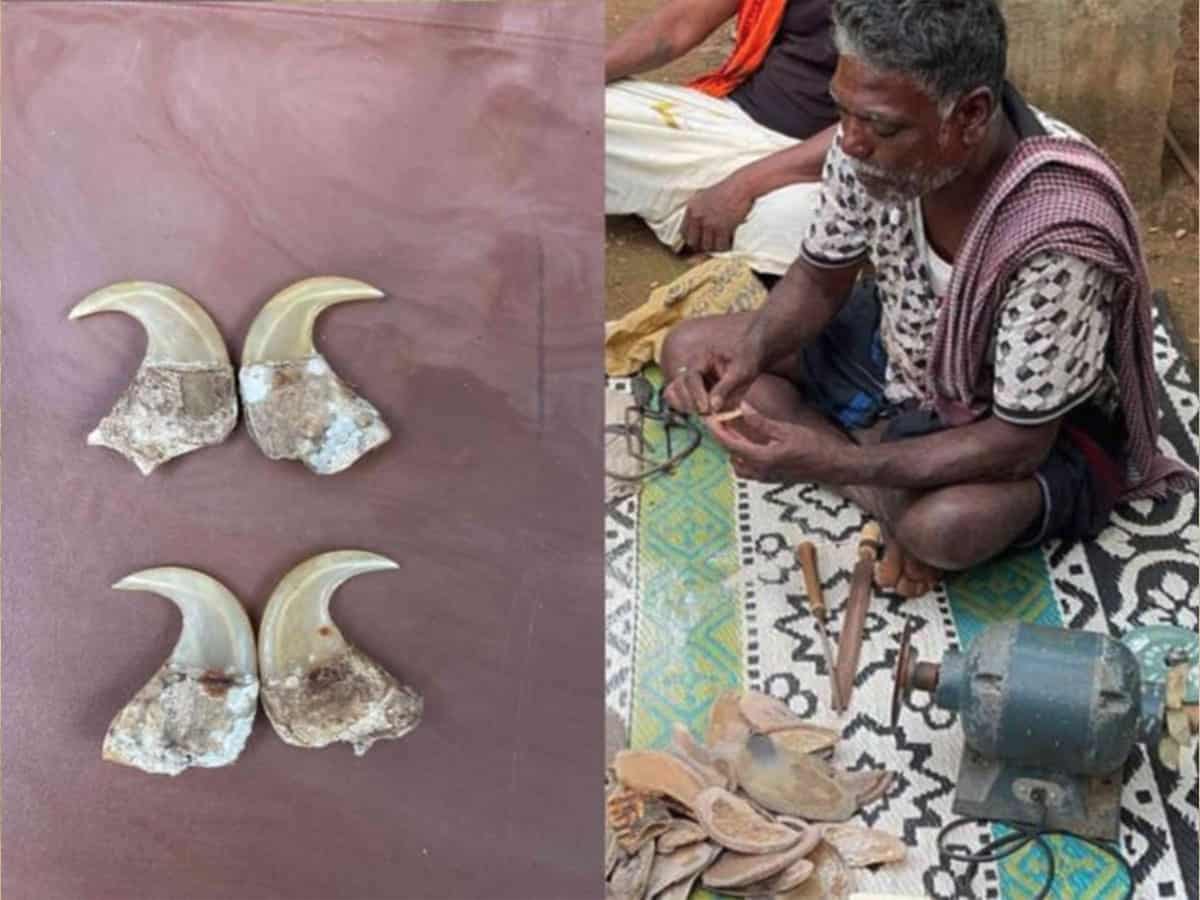
Davanagere: For five decades, the art of crafting artificial tiger claws has been a lifeline for the Hakki Pikki families, a tribe residing in Gopanal village, Channagiri taluk of Davangere district. However, recent developments have brought them newfound troubles, following a crackdown by the Karnataka Forest Department on possession of wildlife artifacts.
The Forest Department’s vigilance in the wake of the arrest of Santosh Varthur (a Bigg Boss Kannada contestant) for wearing a tiger claw pendant has triggered a wave of strict measures. Subsequently, notices were issued to individuals, including the children of prominent actors and politicians who wore the tiger claws. The authenticity of these items was examined and stringent actions followed.
Over the last two weeks, more than 10 cases have bee booked in various parts of Karnataka by forest authorities.
Who are Hakki Pikkis?
The Hakki Pikki community, traditionally a semi-nomadic tribe of bird catchers and hunters, settled in various parts of Karnataka, has undergone a transformation in the past two decades. They have shifted from bird catching and hunting to the preparation of traditional medicines, particularly hair oils. With their distinct language belonging to the Dravidian language family, they are renowned for their expertise in forest resources and their historical involvement in hunting and gathering.
In recent years, initiatives have been launched to help settle the Hakki Pikki community, offering access to education, healthcare, and various other services.
Crafting artificial claws
The Pikki tribe, renowned for their skill in crafting artificial tiger claws and other wildlife artifacts, has borne the brunt of these recent developments. The forest department officials now track the origins of these items, which has instilled apprehension among the Hakki Pikki community.
Traditionally, the Hakki Pikki tribe has been engaged in the art of creating artificial tiger claws as well as items such as rudraksha beads, crystals, massage oils, and artificial tiger and deer skins. These products have been in high demand, not only within the state but across other regions. However, the recent crackdown has brought their business to a standstill, leaving them in a state of shock.
Loss of business
Veerabhadrappa a claw craftsman told Siasat.com that artificial tiger claws are meticulously crafted from the hooves and horns of cows and buffalos sourced from slaughterhouses, which are cleaned, machine-cut, and molded into the shape of a tiger’s nail within minutes.
He said these artificial tiger claws are then sold in front of temples and are priced between Rs 500 and Rs 1,000 each. Additionally, the tribe tans and colors leather from deceased cattle to produce fake tiger and deer skins, which have also been part of their trade for around five decades.
He said earlier they use to supply artificial claws to jewellers but over the last 15 days jewellers had denying to purchase, fearing enquiry by authorities.
‘Committed to protecting wildlife’
Members of the Hakki Pikki tribe have vehemently denied causing harm to wildlife or violating any laws. They express their willingness to cooperate with any checks and inspections but lament the disruption to their way of life and the longstanding tradition of crafting these items.
Puneet Kumar, president of the Karnataka Hakki Pikki Tribal Organisation, commented on the situation, emphasising that the tribe is committed to adhering to the Wildlife Protection Act. They assert their commitment to wildlife preservation and express their desire to live their lives in accordance with their traditions and customs. However, the controversy surrounding artificial tiger claws has left them contemplating their future.

